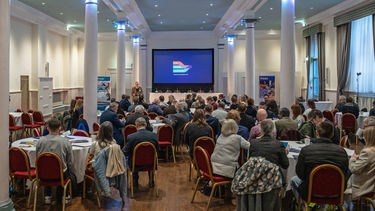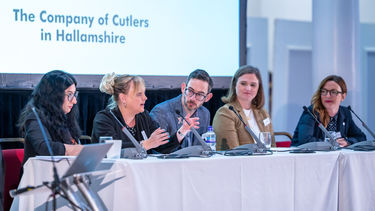Run as part of National Productivity Week 2023, the event aimed to raise awareness of the importance of productivity and the issues that business leaders, policy makers and managers need to address in order to bring about productivity improvements.
Keynote speaker Charles Turner, Master Cutler for the Company of Cutlers, delivered an inspirational but pragmatic speech on how manufacturing has changed over the years in response to changing business needs. He reinforced the importance of businesses being proactive and receptive to innovation and change. Notably, Mr Turner is an alumnus of Sheffield University Management School’s Executive MBA/Advanced Manufacturing Management programme.
Mr Turner stated “I welcomed the opportunity to be involved in the Conference because, to me, the Regional Productivity Forum’s job is to make the case for increasing innovation, training and productivity in the UK. It needs to move people’s focus from the difficulties of understanding new technologies to the opportunities they present and the need to adopt them fast.”
“In my view we have to train, innovate, manufacture and export our way into prosperity by the 2030s. I am the Master Cutler, and so interested in physical products made in South Yorkshire, but by manufacture I mean all types of making, which are needed to generate profits globally for re-investment in the UK to help fund the productivity increases and a resilient national infrastructure that we need.”
Following the keynote speech, there was a robust and lively panel discussion involving a range of experienced industry and policy experts. Hot topics included innovation and digital adoption, net zero transition, management culture, workers’ skills and the importance of location for productivity.
Louisa Harrison-Walker, Chief Executive of the Sheffield Chamber of Commerce said “Thank you to the Sheffield University Management School for convening a conference to discuss The Yorkshire, Humber and North East Productivity Challenge this week at The Cutlers’ Hall. The challenge of improving productivity in any region is not an easy one, there are a myriad of factors that we need to focus on. One thing is clear, that with the world class assets we have at our disposal and our international reputation for excellence, there is no shortage of ambition here and the potential to realise it is huge.”
Andy Barnett from Innovate UK discussed the key role Knowledge Transfer Partnerships can play in bringing together universities and businesses to support business growth and productivity and Sarah Stanley, Business Partnerships Manager at the Sheffield University Management School highlighted the wide range of support available from both the school and wider university for businesses across the area.
Professor Jason Heyes, Academic Lead for the Yorkshire and Humber and North East Regional Productivity Forum, expressed delight about the significant turnout of the event and positive feedback. The organisers anticipate the event has increased awareness of the importance of the productivity agenda for the region and will lead to further discussions about necessary steps to improve productivity growth. Professor Heyes emphasised the crucial role that universities’ research, knowledge exchange and teaching activities play in that regard.






